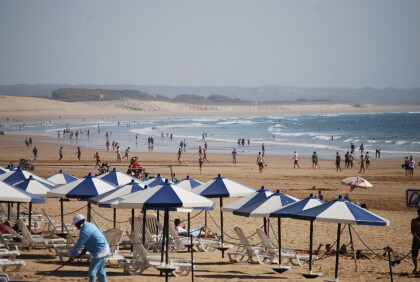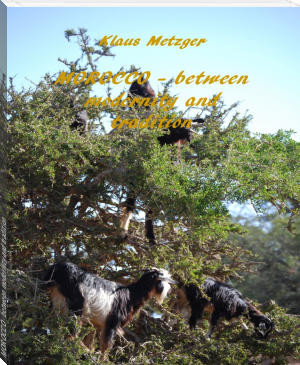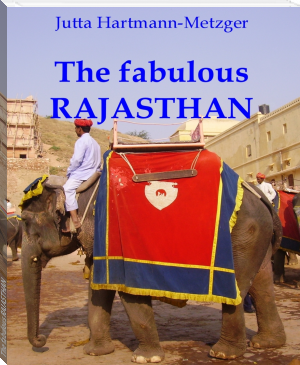Experiences with ARAB Countries, Klaus Metzger, Jutta Hartmann-Metzger [nonfiction book recommendations .txt] 📗

- Author: Klaus Metzger, Jutta Hartmann-Metzger
Book online «Experiences with ARAB Countries, Klaus Metzger, Jutta Hartmann-Metzger [nonfiction book recommendations .txt] 📗». Author Klaus Metzger, Jutta Hartmann-Metzger
Former Portuguese Castel Essaouira (Morocco)
On Tuesday morning, April 17, 2012, we flew from Hannover via Nuremberg to Agadir in Morocco for the ten-day holiday. Especially when flying from southern Germany via France, Spain to North Africa, ideal visibility prevailed. I get very impressive shots. Almost to the day (on Saturday, April 15, 1972) 40 years ago, I flew the same route at night from Frankfurt via Zurich to North Africa. However, my first flight then went to Dakar in Senegal, where we landed at 4 o'clock in the early morning. Across the Atlantic we hit Brazil at the height of Recife and then flew to my destination, Buenos Aires. In Argentina, as a commissioning engineer, I spent an exciting time in La Plata over half a year. In between, I also made several interesting trips to Chile, Brazil, Bolivia and Paraguay.
Back then, while doing beautiful DIA footage of the Brazilian coastline and landing in Buenos Aires with my Asahi Pentax Spotmatic SLR camera, I now own a state-of-the-art NIKON SLR camera and can immediately check the images on the monitor. So I was surprised by the impressive alpine range from an altitude of almost 10,000 meters.
The Alps mountain range
We flew parallel to the Alps and passed by Lake Geneva, which was hidden under a cloud formation at low altitude. At Toulouse in France we flew over the AIRBUS production site with the large airfield. After our plane had flown over to Toulouse, the pilot changed the direction of flight to the south and we crossed the Pyrenees after a short time.
The pyrenees
Through Spain, the impression of the cultivated landscape, as found in Germany and France, has changed to dried-up areas, which have been exploited with the help of water from reservoirs. Completely surprisingly, the snow-capped Sierra Nevada appeared shortly before the Mediterranean and then we were already approaching the North African coast. When we flew over the Atlas Mountains, it was not far to our destination: Agadir. A very interesting flight ended after 3.5 hours and I have taken impressive pictures.
Although we arrived in Agadir with a very positive holiday mood and beautiful summer weather, we surprisingly had difficulties finding our way around this Arab culture at the beginning. It started with the transfer from the airport to the hotel so that the driver of our bus could not find our well known "Agadir Beach Club" and we got presented a free city tour (but without explanations). In our beautiful hotel we were first offered the traditional Moroccan tea, escorted us to a separate room, then gave us papers that we had to fill very accurately with our personal information. Only then we received the room key - far from the hotel reception.
Also the first exploration into the very modern and international city center was a big disappointment: We were only looking for a supermarket, where we could buy drinks and fruit. But there were no markets and were closed until 15 o'clock. This irritated us a lot - although I was able to understand myself in French and we were obviously always misguided. So we decided to lunch in front of a small restaurant near the bird park (at the Place Bijaouane). We enjoyed the grilled fish and drank beer or rose wine. The whole cost 20 euros (a good price).
Shop passage near the hotel
The following day the motto was: "New game - new luck". We had learned from the very helpful lady at the hotel information that you could drive quite cheaply by taxi (20 dirhams or about 2 euros) to a very large supermarket "Marjane". There you would get everything - in addition to drinks and fruit clothes and shoes. The latter (swimming trunks, shorts and sandals) we could buy there very reasonably priced. On the way back by taxi to the hotel I discovered a shopping arcade nearby. It was on the right hand side of the hotel (the day before we left the city center left) and was within a 10 minute walk to reach.
Supermarket near the hotel
This was the adventure of the 3rd day: the exploration of the discovered shopping arcade. Jutta found a very nice, country-typical beach dress, which she could negotiate on 400 dirhams (about 40 euros). And there we also found the small supermarket, which could satisfy all our desires (the fruit we took after lunch from the buffet). However, thie market had a longer lunch break until 4pm.
Fortunately, the exploration of our very extensive hotel complex "Agadir Beach Club" from the beginning much less stressful and we found very quickly a cozy place at the swimming pool on a beach chair with a mat and - on request - a parasol (this was after 11 o'clock very useful). Less pleasant was the pool, which unfortunately was not deep enough to swim well. Nevertheless I found for my obligatory hotel evaluation the representative title "recovery in the Blumenparadies" (with pleasure I read of the "HolidayCheck Award 2012", with which the "Agadir Beach Club" as one of the 99 best hotels in the world was awarded).
Agadir Beach Club
The arrangement of the building complex in ring form with the beautiful garden resulted in an oasis of silence in the noisy and bustling Agadir. We enjoyed the morning time at the swimming pool and retired after the excellent lunch buffet (from 12:30 clock) for siesta back to our room.
After the disappointment on the first day, we were on the following days, the international Agadir, which has adjusted with its numerous hotels on the tourists from Europe, no charm. This is also connected with the special fate of Agadir: On February 29, 1960, the inhabitants experienced a momentous earthquake (the epicenter was below the medina). Within fifteen seconds, four-fifths of all homes collapsed and 15,000 people (out of 50,000) died. One did not lose heart and with international help built up the new, modern Agadir. That's why Agadir feels like a seaside resort in the south of France. We later got to know the Arabian flair on our excursions to Essaouira and Taroudannt.

Beach of Agadir
The beautiful beach (10 km long and up to 200 m wide) is certainly the special attraction of modern Agadir. At the back of our "Agadir Beach Club Hotel" was a door that made it easy to get across the beach promenade to the beautiful sandy beach. Through this door, we smuggled "unobserved" drinks to the hotel - although it was not officially allowed. The door to the beach was closed every evening at 19:30.
Hotel beach bar with sun loungers
Directly opposite the hotel was a beach bar with numerous sun loungers and parasols. Whoever wanted it could spend the whole day there. We took longer walks on the beach, washed our feet and moved back to our beach chairs by the pool or moved back to our room. There we felt more comfortable and completely unmolested by the "Flying Dealers".
The port of Agadir (in the background)
During our beach walks towards Agadir town center you could very well see the docks at the top of the beach. On our day trip to Essaouira we drove past the port and I got very nice shots.
The Atlantic coast at Tarhazout
This bus trip on the Atlantic coast to Essaouira (on Monday, April 20, 2012) in a northerly direction turned into a real time journey into the past of the Moroccan inhabitants. But first things first! Behind Agadir began a stunning rocky coast with foaming waves. At Tarhazout we discovered in front of the "Paradis-Plaga" enthusiastic surfers, who fascinated these fantastic waves. This interest can not be rested by the government, or more precisely by the tourism ministry. She plans stylish accommodations with max. 16,000 beds ("Vision 2010").
Banana plantation at Tamri
When Cap Rhir (with the lighthouse at 361 m altitude), we moved away from the coast and drove inland. On the P 8 we went north until just before Essaouira. Although we also came through fertile valleys (where there were larger banana plantations), we passed a similarly barren landscape as I experienced more than 40 years ago in the Andes.
herd of goats
We found it a veritable cultural shock to drive in a comfortable coach through a landscape in which people, like hundreds of years ago, moved on donkeys and dromedaries at a leisurely pace. And although the sun shines very intensively, we could almost never see solar panels on the roofs. What surprised us, however, were houses that had to be demolished again (the remains were still around), as they did not meet the strict earthquake regulations in Morocco.
Cooperative Marjana
After a short break in Tamanar we drove on to the Cooperative Marjana, where we were shown the laborious production of the precious Argane oil. Moroccan women were sitting on the ground, laboriously cracking stones with stones, and then extracting the expensive oil with an ancient stone mill. Jutta and I had our doubts as to whether this really is the production method used (in China we had experienced a gemstone grinding shop, where you only worked when tourists were present).
SUPPLEMENT: In a GOOGLE + post from Agadir, Morocco, I received the following additional information about the Cooperative Marjana:
"Good morning sir,
We are an agricultural cooperative for the production of Argan oil and its derivatives
Our product holds a certificate of quality European
Certificate of quality organic
Certificate Products Staff
Look for business partners in Morocco and abroad
Of communication you can contact us on
00212 528 887 013"
Butcher's shop in the old town of Essaouira
After traveling for a total of 4 hours (from Agadir) we arrived at 11:30 in the city of Essaouira, which was recommended to us for its traditional Islamic atmosphere. The former Portuguese fort at the harbor was highly visible. But my wife and I wanted to look around alone in the old town (behind the massive fortress walls). Therefore, we parted from the tour group, we only at the departure date at 15:30 to Agadir again.
The minaret of the mosque
We were very impressed with the city that Muhammed Ben Abdallah built in the mid-18th century by a captured French engineer named Cornut. The result was an old town with straight streets and not as usual in Morocco as a maze with crooked dead ends.
The restaurant "La Cantina"
However, we were only looking for a smaller, clean restaurant, as we wanted to have lunch. Surprisingly we found the English-run restaurant "La Cantina". The chilli burger and the homemade cake tasted excellent and the friendly English women were certainly pleased about our enthusiasm. After this delicious meal, we went in search of photo opportunities. That was no problem with the interesting streets





Comments (0)